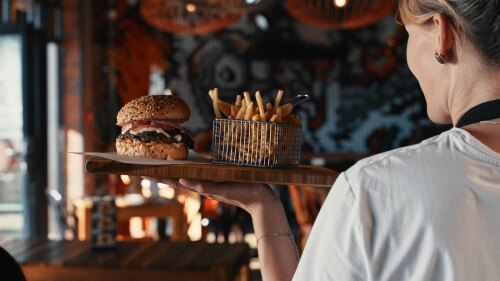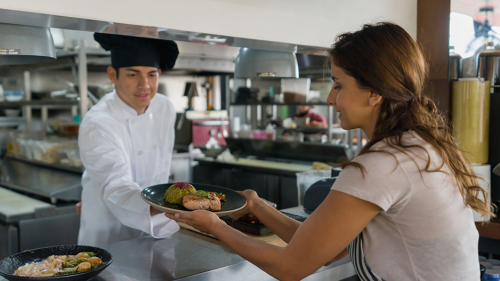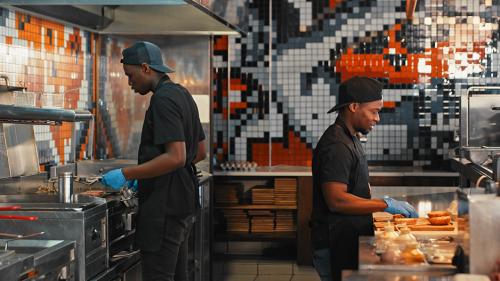Providing proper commercial kitchen knife safety education for safety guards, equipment, and training will also help to prevent workers from being injured.
Knives
Stock your kitchen with a variety of knife sizes and types so the appropriate knife can be used for each task. Provide proper storage for knives, such as racks or blocks. When cutting with a knife, make sure to tuck in the fingers of the hand holding the food.
Let a falling knife fall. If a knife is about to fall, step back, warn others, and let it fall. Do not try to catch the knife.
Cut-resistant gloves can be worn when handling knives or other cutting equipment, especially for any bulk cutting. Ensure gloves fit well, cover the wrists, and are properly maintained and replaced as needed.
Additional knife safety tips
- Always keep knives sharp
- Never leave knives soaking in water
- Use a damp cloth or nonslip mat under cutting boards to prevent slipping while using knives
- Put the knife down anytime you are not actively cutting
- Carry knives stored in a protective case or sheath
- Pass knives by laying them on the counter for the other person to pick-up, or pass it to them with the blade pointed down vertically
Slicers, grinders, food processors
Keep the blades of slicers, grinders, and food processors sharp. Before using a machine, make sure all safety guards are secured in place.
Never wear hanging jewelry while operating a machine, and keep hands, face, hair, and loose clothing away from any moving parts. Wear protective gear such as cut-resistant gloves and arm protectors when operating a slicer or grinder.
Glass and dishware
Store glasses, bottles, and dishes away from high-traffic areas to reduce the risk of bumping them. Use racks to store glasses so they’re not stacked directly on top of each other.
Dispose of chipped or cracked dishware immediately. Designate a trash can or bin for broken glass and other sharp items, like can lids. Wear gloves and goggles when cleaning up any broken glass or dish.
Only use heavy-duty plastic or metal scoops for food or ice — never use drinking glasses that can easily break.
The information and recommendations contained in this material have been obtained from sources believed to be reliable. However, SECURA accepts no legal responsibility for the accuracy, sufficiency, or completeness of such information. Additional safety and health procedures may be required under particular circumstances. Please your SECURA Risk Management Consultant for more information.






